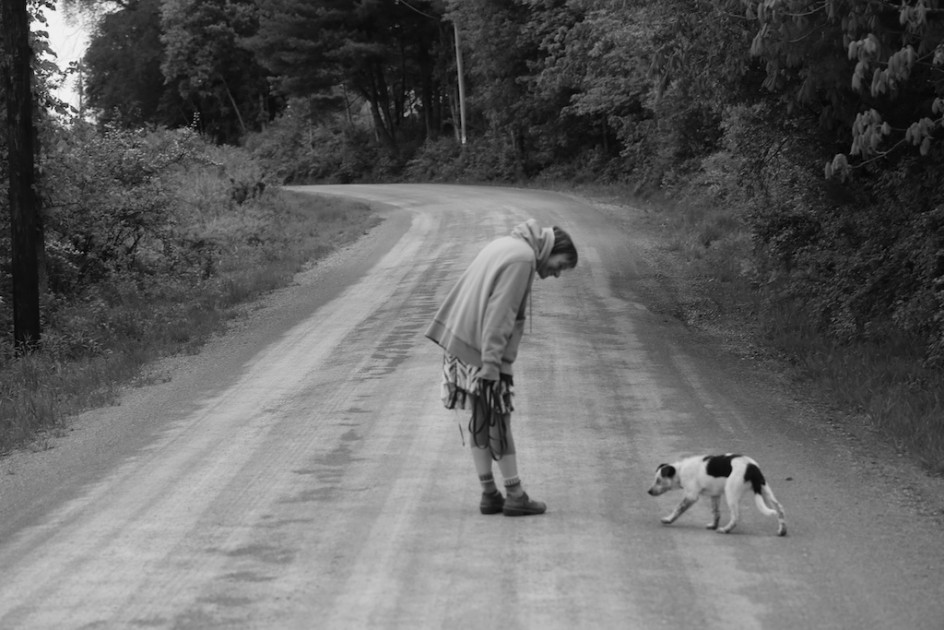
I believe dog training starts the moment the dog arrives, and continues until they die or move on. Fate has all the makings of a great dog. Karen Thompson says – correctly – that good training is 50 per cent breeding and genetics, the other 50 per cent is up to the human. She comes with a clean slate, it is up to Maria and me what is drawn there.
Fate has been with us three days now. She is housebroken, responds to her name, comes when called about 70 per cent of the time. She chews on her toys, not our things. She is very energetic, very smart, she crawls through tiny spaces, pushes doors open, gets mouthy with people and things. She is intensely social, we continue to socialize her.
She is behaving beautifully in Maria’s studio, she sleeps there, lies in her crate, leaves Maria to do her work. Working dogs will do this for people, they seem to grasp the nature of work.
Fate barks when she sees Minnie, who runs from her. Flo stands her ground and looks her in the eye, and Fate backs away. She wants no part of Flo. Flo is fearless. At night, she needs help in slowing down, I put my foot on a long lede and keep it there, she cannot move far. She struggles to get away, barks in protest, then lies down and begins learning how to be still.
I insist that she learn to be calm in our house, she has a lot of good stuff to chew, but she must learn to settle down.
She watches Red through the fence as he herds the sheep, she is intent on it. We are not taking her to sheep any longer.
We are working on two things at the moment. The first is calming training, a passion of mine. Dogs like Fate (and most Labs) know how to do everything but nothing, and nothing is what they most need to learn how to do. I don’t want a hyper or crazy dog, a crate helps her stay calm within herself, occupy herself, calm her sometimes frantic energy. When we are not watching her, and she is in the house, she is in a crate.
No surprises, no trouble, no accidents. She can do nothing but chew on her stuff and settle down. Already, she goes to the crate when she is tired.
Maria is doing much of the training now, I helped get it started. She feeds Fate, walks her, takes her out, gives her treats – all of these are bonding behaviors. Shaping behaviors occur when the dog is given a chance to do what we want them to do, so we can praise them for it and mark, or shape their behavior.
We are training Fate to walk off-leash on our country roads and paths in the woods. Dogs ought not be given the opportunity to misbehave – this is why crates are so important. They must also be given a chance to do good. On our walk, we took the leash off of Fate for several minutes at a time. Maria offers her treats, praise and excitement when she comes when called, which she mostly does.
We never give her a command we do not know we can enforce. Shouting a lot of frustrated words at confused dogs wrecks most training quickly. If we say “come,” she has to come, even if we have to slowly pull her to us. We do not yell her name when she is clearly distracted or paying no attention. We wait until she is watching, or we use the leash to pull her to us then praise her for being there.
Dogs this age do not have long attention spans or deep reasoning skills, so training needs to be light and clear and quick. We walked quickly ahead and Fate tended to follow. Once or twice, she got stuck sniffing something, we walked ahead quickly. She would look up, be startled that we were come, and come running to us. Then, we could shower her with praise.
We did very well for the first day. She walked a quarter-of-a-mile up the hill with Maria, on the way back she ran into neighbor’s barn to investigate some smells. A reminder to take nothing for granted, we will work at it a little bit every day. We are shaping a behavior. We walk up this road every day, it will become a tradition. If she never runs off these next few says (border collies are not nose dogs, they rarely run away from their people, they’d rather herd them). Maria praises her, offers treats and affection. I believe she is getting this, and by the end of next month, she will be there.
I am mindful she is a small, not yet developed dog. She needs a lot of patience and clarity. And a lot of love.
